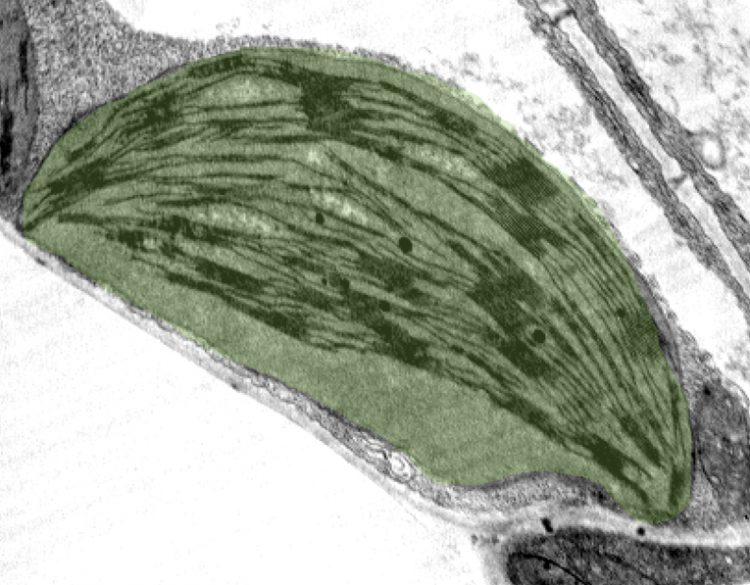Water or Land? Plants control their photosynthesis similarly, regardless of their origin

The microscopic image shows a chloroplast in which the photosynthesis takes place. Credits: Dr. Alexander Hertle, MPI für Molekulare Pflanzenphysiologie
In photosynthesis, plants produce carbohydrates from CO2 using light. During this process, they also release oxygen. This biochemically complex process takes place in chloroplasts, small green organelles with their own genome. “It also contains the genes of the proteins involved in photosynthesis,” said assistant professor Dr Felix Willmund from the group of Molecular Genetics of Eukaryotes at the Technische Universität Kaiserslautern.
In order to “convert” this genetic information into proteins, the first step is to copy the genetic material into a transcript, termed ribonucleic acid (RNA). “The transcript serves as a kind of blueprint with the help of which large molecule complexes, the so-called ribosomes, assemble proteins from individual amino acids,” says lead author Dr Raphael Trösch, who is part of the Willmund research group on the Kaiserslautern campus. This process is also known as translation.
In the current study, Trösch and Willmund together with colleagues around Dr Reimo Zoschke from the Max Planck Institute for Molecular Plant Physiology (MPI-MP) in Potsdam-Golm investigated whether there are differences between land plants and algae that are far apart in evolutionary history. They compared these molecular processes in green algae, tobacco plants and Arabidopsis thaliana using a new method. They applied the so-called ribosome profiling.
In this method, the researchers take a look at the RNA and ribosomes present during translation. Similar to a footprint, ribosomes leave traces on the RNA that allow scientists to create a characteristic image that shows them which proteins are produced in what quantities.
The clue is as follows: “This technique provides us with an overview of the entire translation process, but we can also take a closer look at details,” said Zoschke, who heads the Translational Regulation in Plants working group at the MPI-MP.
“For all three plant species, we found that the same amounts of proteins are formed during translation that play a role in photosynthesis,” explains Zoschke. However, the researchers have also found that there are differences in the molecular processes that occur before and during translation. “Nevertheless, over the course of evolution, the different plants have developed mechanisms to produce the same photosynthesis components in equal amounts during translation,” says Willmund. “This shows the central importance of these molecules.”
The studies took place in the Collaborative Research Centre (SFB Transregio TRR175) “The Green Hub – Central Coordinator of Acclimation in Plants”. It has been funded by the German Research Foundation since 2016. Research teams from Berlin, Potsdam-Golm, Munich, and Kaiserslautern are investigating how plants can adapt to changing environmental conditions.
The results of the current study also show that plants succeeded with different strategies in achieving a very similar photosynthesis process despite different living conditions. It is therefore important to investigate such fundamental processes in order to better understand which mechanisms plants use to cope with environmental influences such as strong changes in temperature or light, for example. In the future, this knowledge will help to make crop plants more resistant to climate change.
The study was published in the renowned journal “Nature Plants”:
“Commonalities and differences of chloroplast translation in a green alga and land plants”
DOI: 10.1038/s41477-018-0211-0
Questions can be directed to:
Assistant Professor Dr Felix Willmund
Molecular Genetics of Eukaryotes / TU Kaiserslautern
Phone: +49(0)631 205-3254
E-mail: willmund(at)bio.uni-kl.de
Dr Reimo Zoschke
Translational regulation in plants
Planck Institute of Molecular Plant Physiology
Phone: +49(0)331 567-8375
E-mail: zoschke(at)mpimp-golm.mpg.de
Assistant Professor Dr Felix Willmund
Molecular Genetics of Eukaryotes / TU Kaiserslautern
Phone: +49(0)631 205-3254
E-mail: willmund(at)bio.uni-kl.de
Dr Reimo Zoschke
Translational regulation in plants
Planck Institute of Molecular Plant Physiology
Phone: +49(0)331 567-8375
E-mail: zoschke(at)mpimp-golm.mpg.de
Nature Plants: Commonalities and differences of chloroplast translation in a green alga and land plants
Raphael Trösch, Rouhollah Barahimipour, Yang Gao, Jesús Agustín Badillo-Corona, Vincent Leon Gotsmann, David Zimmer, Timo Mühlhaus, Reimo Zoschke &
Felix Willmund
DOI: 10.1038/s41477-018-0211-0
Media Contact
All latest news from the category: Life Sciences and Chemistry
Articles and reports from the Life Sciences and chemistry area deal with applied and basic research into modern biology, chemistry and human medicine.
Valuable information can be found on a range of life sciences fields including bacteriology, biochemistry, bionics, bioinformatics, biophysics, biotechnology, genetics, geobotany, human biology, marine biology, microbiology, molecular biology, cellular biology, zoology, bioinorganic chemistry, microchemistry and environmental chemistry.
Newest articles

A new class of cosmic X-ray sources discovered
An international team of astronomers, led by researchers from the Astronomical Observatory of the University of Warsaw, have identified a new class of cosmic X-ray sources. The findings have been…

An open solution to improving research reproducibility
Academic and industry scientists collaborate on a new method to characterize research antibodies. Structural Genomics Consortium researchers at The Neuro (Montreal Neurological Institute-Hospital) of McGill University, in collaboration with scientists…

Living in the deep, dark, slow lane
Insights from the first global appraisal of microbiomes in earth’s subsurface environments. Which microbes thrive below us in darkness – in gold mines, in aquifers, in deep boreholes in the…



